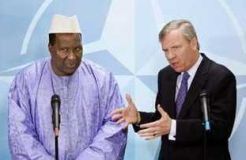Diplomatic battle shapes up over NATO presence in Darfur
Feb 1, 2006 (CAIRO) — The internationalisation of the peacekeeping force in Sudan’s troubled Darfur region is unavoidable but the prospect of a NATO deployment could herald a new tug-of-war between the West and Khartoum, analysts say.
 Three years after the conflict in the western Sudanese region erupted, dozens of people still die every day and the risk of a new war breaking out with Chad is growing, prompting the international community to change strategies.
Three years after the conflict in the western Sudanese region erupted, dozens of people still die every day and the risk of a new war breaking out with Chad is growing, prompting the international community to change strategies.
“When I visited Darfur last May, I felt hopeful. Today, I am pessimistic, unless a major new international effort is mustered in the coming weeks,” UN Secretary General Kofi Annan said in a letter published by the Washington Post last week.
The war broke out in February 2003, when black ethnic groups launched a rebellion against Khartoum, which was brutally repressed by the Arab Islamist regime of President Omar al-Beshir.
The combined effect of the war and one of the world’s worst humanitarian crises has left up to 300,000 people dead and an estimated 2.4 million displaced.
African Union troops, on the body’s first ever peacekeeping assignment, were deployed in Darfur in 2004. But the 7,000-strong contingent has been dogged by insufficient fund and has struggled to prevent the bloodshed.
“The transition from the AU force to a UN operation in Darfur is now inevitable,” Annan said. The AU peacekeepers’ mandate was renewed in January until March 31.
Beshir has fiercely opposed a UN deployment in Darfur, stressing that only an African effort would bring an end to the conflict.
AU-sponsored negotiations between Khartoum and the rebel groups in Nigeria have resumed but the previous rounds of talks have failed to yield any breakthroughs.
US Secretary of State Condoleezza Rice has already said she favoured a UN deployment in Darfur and a proposal to that purpose could be drafted with Washington’s takeover of UN Security Council chair this month.
But Annan’s envoy in Sudan, Jan Pronk, has warned that such a deployment would take time to overcome all the political obstacles likely to arise on its path and would most likely not materialise until late 2006 or early 2007.
“In the meantime, the AU mission must be maintained and strengthened. We cannot afford any gaps or any weakening of the force in place,” Annan said. This was perceived as a thinly veiled reference to a scenario involving NATO (North Atlantic Treaty Organisation).
“Countries that have the required military assets must be ready to deploy them,” he said, stressing that the next peacekeeping force should be “larger, more mobile and much better equipped.”
After painting a bleak picture of the situation in Darfur to the UN Security Council, Pronk headed straight to NATO headquarters in Brussels, diplomatic sources told AFP.
“The involvement of NATO would certainly raise a few problems and Sudan will do everything it can to prevent it,” a European diplomat in Khartoum said.
But Sudan expert Suliman Baldo, from the International Crisis Group think-tank, whilst admitting that Khartoum would fiercely oppose such a move, said NATO’s involvement was almost inevitable.
“There is no alternative to bridge the gap between the AU and UN forces,” he told AFP.
He said, however, that a proposal for Western armies to be deployed in Darfur would trigger a diplomatic battle, with the Sudanese government seeking the support China in the Security Council and of Arab countries during the March 28-29 Arab summit in Khartoum.
US-based Sudan expert Eric Reeves concurred.
“I am afraid that if the United Nations is our conduit for a peace making force into Darfur, we are talking about many months. In those months, we could see wholesale catastrophe,” he said in a recent interview to a Sudanese newspaper.
“I would argue that NATO needs to provide a bridging force for an eventual United Nations deployment,” he added.
(ST/AFP)
